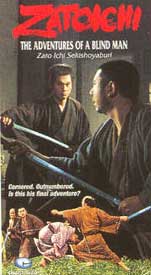 Neither the worst nor best director to handle a Zatoichi tale, Kimiyosha Yasuda's Adventures of a Blind Man (Zatoichi sekisho yaburi, 1964) is a workmanlike but satisfying episode. Neither the worst nor best director to handle a Zatoichi tale, Kimiyosha Yasuda's Adventures of a Blind Man (Zatoichi sekisho yaburi, 1964) is a workmanlike but satisfying episode.
Shintaro Katsu as Zatoichi is supported by a skilled cast. The story opens, before the credits, with a lighthearted vignette of Ichi standing in a terrible windstorm, smiling as though he doesn't care how rough the weather is, saying, "A lot of dust. I'm lucky I'm blind."
Such opening vignettes were used in several Ichi episodes, as counterpoints to episodes which open on a scene of violence.
This calmer method of introducing Ichi s pleasant, though the pleasantness will be given an opposite meaning at the end when Ichi faces a young insistent ronin in a storm.
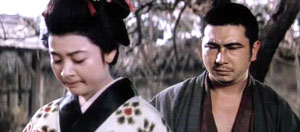 Zatoichi films can be convoluted in plot but most boil down to fairly simple plot of Ichi wandering into a village terrorized by gangsters/yakuza. Ichi tries to intercede in behalf of good people, failing because of recalcitrant bad guys, thus Ichi has to kill everyone bad & a few score flunkies while he's at it. Zatoichi films can be convoluted in plot but most boil down to fairly simple plot of Ichi wandering into a village terrorized by gangsters/yakuza. Ichi tries to intercede in behalf of good people, failing because of recalcitrant bad guys, thus Ichi has to kill everyone bad & a few score flunkies while he's at it.
The plot this time is built around the pending new year festival. Yakuza are demanding a radically unreasonable forty percent of proceeds.
Ichi has come "to see the sunrise on Mount Myogi" despite that he's blind. He's not at first inclined to interfer in local troubles, for when he does things tend to get increasingly violent & he ends up making still more enemies, of which he already has plenty. But as always, his eventual involvement must occur.
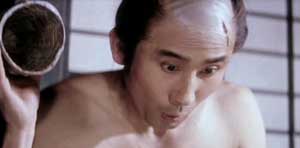 Much of the tale is structured more for comedy effect than bloodshed, with comedians credited as "Racket Nakada" & "Daimaru" providing slapstick relief during an already humorous script. Well, humorous until the violent conclusion at least. Much of the tale is structured more for comedy effect than bloodshed, with comedians credited as "Racket Nakada" & "Daimaru" providing slapstick relief during an already humorous script. Well, humorous until the violent conclusion at least.
Here again Zatoichi films can be divided into two moods, those which contrast comedy with violence, & those which are flat-out gloomy & convey Ichi's demonic qualities. I prefer the latter sorts of episodes, but Katsu's comedic capacity is undeniable & impressive.
In an early scene, Ichi enters a gambling hall rattling a large purse to get attention. He is invited to play the house dicer face to face, one on one. Ichi acts honored by the gracious welcome & opportunity, pretending to be a naif who hasn't a clue they intend to cheat him of his purse, thinking a blind man an easy mark.
Ichi draws his sword & replaces it so swiftly that no one even noticed his iai draw as the dice are thrown into the cup then plopped onto the mat.
When the cup is lifted from the dice, they turn out each to have been cut in half. Ichi then draws his sword again, cuts off the dicer's top-knot, & finds the unloaded dice hidden therein.
A little gambling, a little joshing about, getting to know a few nice people whose lives are negatively impacted by bad people -- it's a successful formula within which a devotee can expect interesting variations but not much that is new.
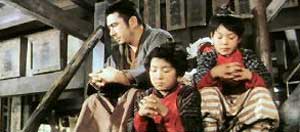 Until Ichi becomes the menacing, brooding, gruesome avenger, a lot will happen that amuses. Ichi will have met several interesting characters, including two adorable "lion dance boys" who make their living doing acrobats in the street. They become embroiled in Ichi's adventure, his little spies. Until Ichi becomes the menacing, brooding, gruesome avenger, a lot will happen that amuses. Ichi will have met several interesting characters, including two adorable "lion dance boys" who make their living doing acrobats in the street. They become embroiled in Ichi's adventure, his little spies.
Ichi interacts with kids in a great many episodes, & at the height of the series' popularity, children were certainly a major part of the audience. But by western expectation, these aren't children's films by any stretch, & for their exceedingly violent climaxes, would be rated so as to keep children out.
Ichi is given the gift of a blind Daruma doll, one of those red, rolly pollies. He says to the doll, "A blind man with a blind dharma. Let's be friends!"
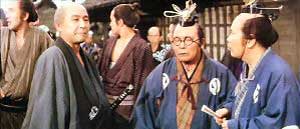 He ends up giving it to the young woman Osen (Eiko Taki) who is looking for her father, a missing village headman. He ends up giving it to the young woman Osen (Eiko Taki) who is looking for her father, a missing village headman.
Blind dharmas are given eyes one at a time for propitious occasions. Osen & Ichi agree that the dharma will receive one eye from each them, one when Osen finds her father, the other eye when Ichi finds his.
We know from previous episodes that Ichi's mother died when he was a toddler. Now we learn that he was separated from his father when a child of five. I was intrigued by what kind of man his father would turn out to be, but prepared to be disappointed in case there was no such person found.
Unfortunately for Osen, her father turns out to have been murdered, apparently by the naive brother of Osaki (Miwa Takada), another woman Ichi had hoped to help. Osaki's brother has been tricked into attacking the corrupt Jinbei (Kichijiro Ueda), a situation that leads to close scrapes for Ichi & his new friends, forcing humble Ichi to heights of machismo.
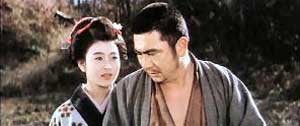 There is still a chance Ichi can find his dad, as it seems the man may be living in this very town. There is still a chance Ichi can find his dad, as it seems the man may be living in this very town.
A pitiful old drunkard, Giji (Yuzaburo II, who by this name I assume was a kabuki actor more than he was a film actor), tells the story of how he lost his little boy many years before. The circumstances sound familiar to Ichi.
Befriending the old man but not letting on that they might be kin, Ichi trusts Giji even with Osen's life, only to discover that Giji is a weak, bad man. Life is full of disappointments & perhaps it's just as well if Giji is no relation of Ichi's.
Other elements of the tale seem all familiar by the ninth episode, but are at least well done. A young yojimbo bodyguard, Gounosuke (Mikijiro Hira), is working for the bad yakuza boss Jinbei (Kichijiro Ueda).
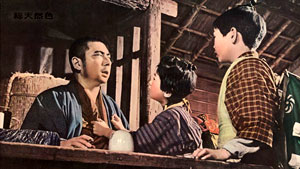 Gounosuke's needs are small ones, but he has one great desire in life: "I want to meet a swordsman stronger than me." Gounosuke's needs are small ones, but he has one great desire in life: "I want to meet a swordsman stronger than me."
In Zatoichi he perceives the chance at achieving his desire. This makes Ichi exceedingly sorrowful, for Gounosuke is at base a decent man, not someone Ichi could ever be happy to have killed.
Their encounter inevitably occurs, with grand posturing in a storm, & when two essentially good men duel in these films, it's always effectively emotional."I lost," is all Gounosuke says with understated simplicity, then falls. Ichi covers the body of ronin with his own jacket.
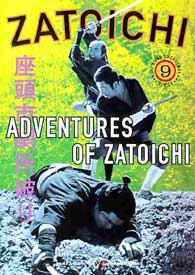 Ichi of course expresses no such sentiment when cutting down the gangster boss's numerous minions. But a strong man who was a good man, this one's sad for him. Ichi of course expresses no such sentiment when cutting down the gangster boss's numerous minions. But a strong man who was a good man, this one's sad for him.
For a samurai like Gounosuke, the duel is its own justification, but for an outcast like Ichi, it's easy enough to grasp why he kills every bad guy in his canesword's reach, but not as comprehensible that he also duels men he likes.
He may feel he's not being given a choice, but more likely for all his humble posturing, his pride of fighting prowess has a bit of the samurai underneath. But unlike the warrior class, he does not see death by fair duel as a good way to die; it is a tragic waste; & Ichi carries a heavy burden of guilt.
Ichi still has many left to kill, men of no consequence really. With Ichi's weird agility & overwhelming physical presence, no gangster who points a sword in his direction has a chance in hell. They might as well be tin ducks in a shooting gallery.
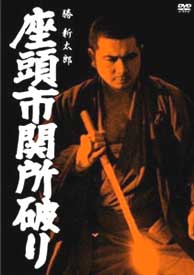 Another yojimbo, an older fellow (Akitake Kono), has bamboozled his way into employment with the bad oyabun in order to have drinking funds & a warm place to sleep. Another yojimbo, an older fellow (Akitake Kono), has bamboozled his way into employment with the bad oyabun in order to have drinking funds & a warm place to sleep.
He's either a coward or much more likely just a very smart man. He never does manage to fight Ichi, & we never do find out if he even had any skill. The two yojimbo characters, starkly contrasted in attitude, are beautifully portrayed.
After the expected bloody climax packed with wholesale slaughter, our emotionally tormented blind hero says, discouraged & angry, "I came to see the sunrise on Mount Myogi. It was to be a peaceful trip."
He abandons not only the place of corpses he has made, but also Osen, the lion dance boys, everyone & everything, & is last seen on Mount Myogi praying as the sun sets.
This tortured hero thing might be an awful cliche, but I completely buy into it. And the effectiveness of Zatoichi's character is not to be underestimated or denied. Katsushin was a great actor in many sorts of roles, but Ichi was the character he was born to play, immortally iconic, & gods am I glad he was able to play him so very often through the years.
copyright © by Paghat the Ratgirl
|
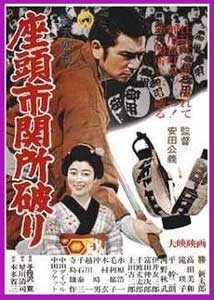

 Zatoichi films can be convoluted in plot but most boil down to fairly simple plot of Ichi wandering into a village terrorized by gangsters/yakuza. Ichi tries to intercede in behalf of good people, failing because of recalcitrant bad guys, thus Ichi has to kill everyone bad & a few score flunkies while he's at it.
Zatoichi films can be convoluted in plot but most boil down to fairly simple plot of Ichi wandering into a village terrorized by gangsters/yakuza. Ichi tries to intercede in behalf of good people, failing because of recalcitrant bad guys, thus Ichi has to kill everyone bad & a few score flunkies while he's at it.

 He ends up giving it to the young woman Osen (Eiko Taki) who is looking for her father, a missing village headman.
He ends up giving it to the young woman Osen (Eiko Taki) who is looking for her father, a missing village headman.
 Gounosuke's needs are small ones, but he has one great desire in life: "I want to meet a swordsman stronger than me."
Gounosuke's needs are small ones, but he has one great desire in life: "I want to meet a swordsman stronger than me." Ichi of course expresses no such sentiment when cutting down the gangster boss's numerous minions. But a strong man who was a good man, this one's sad for him.
Ichi of course expresses no such sentiment when cutting down the gangster boss's numerous minions. But a strong man who was a good man, this one's sad for him. Another yojimbo, an older fellow (Akitake Kono), has bamboozled his way into employment with the bad oyabun in order to have drinking funds & a warm place to sleep.
Another yojimbo, an older fellow (Akitake Kono), has bamboozled his way into employment with the bad oyabun in order to have drinking funds & a warm place to sleep.